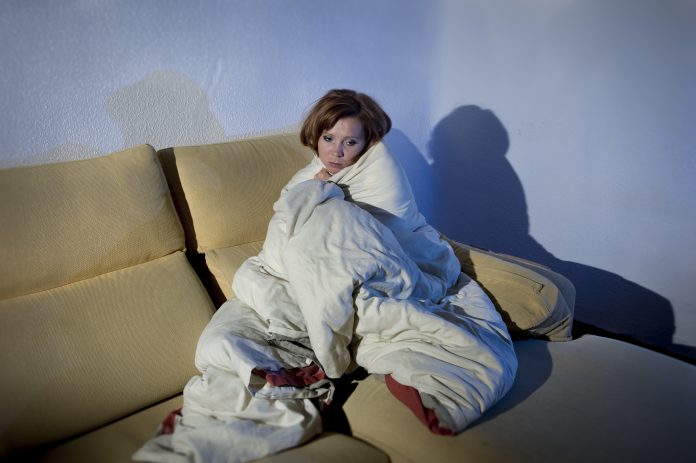Commonly feeling cold when others are not complaining of it may not be to do with your lack of central heating – you may be experiencing cold intolerance
If you suffer from cold intolerance, you will feel cold, even on a warm day. It’s worse than just feeling chilly, often causing symptoms such as cold hands and feet, stiffness, numbness and/or tingling, burning sensations, painful fingers, toes and joints, and your skin may look white and pale or flush red. You may shiver uncontrollably.
Cold intolerance is not the same as hypothermia, as those with cold intolerance feel cold but have a body temperature within the normal range. They also find it hard to warm up, despite doing all the right things. Women have lower cold tolerance than men, perhaps because they have a lower resting metabolic rate. Older people feel the cold more than younger people because they tend to have lower muscle mass.
There is little or no research on the risks of cold intolerance. However, the condition is linked to a range of medical conditions which reduce the quality of life and life expectancy. Getting an accurate diagnosis, if possible, and managing any associated conditions optimally, gives the best chance of a good outcome.
Medical conditions linked to cold intolerance
You might have cold intolerance if you have any of the following medical conditions or contributory factors:
- Anaemia
- This sets in when your haemoglobin levels are low due to a lack of red blood cells. Anaemia is a symptom and always needs investigation to find out the cause. You may feel weak and tired and look pale and unwell. Too few red blood cells result in reduced oxygenation, affecting your ability to feel hot or cold.
- Poor blood circulation
- As we age, our arteries become furred up with fatty deposits – like the inside of the kettle – by a condition called atherosclerosis. Because the blocked arteries have a narrowed lumen, blood cannot pass through them as it needs to, and the tissues beyond the blockage become relatively starved of oxygen. This may mean that your toes and feet look pale, with bluish nail beds, and feel cold.
- Raynaud’s Syndrome
- In this condition, cold temperatures trigger a spasm in the arteries, making the fingers and toes turn white, blue, and red as the blood flow returns. This is thought to be an autoimmune disease possibly.
- Hypothyroidism
- An underactive thyroid gland does not produce enough of the thyroid hormone thyroxine. Thyroxine regulates body temperature, helping to lower your temperature before sleep. When you don’t have enough thyroxine, this can lead to a lower body temperature during the day.
- Diabetes
- Diabetes is a cause of diabetic peripheral neuropathy – damage to the peripheral nerves, meaning your body cannot feel hot and cold temperatures in the skin of the feet, hands or other extremities. People with this condition often say they feel cold all the time.
- Menopause
- Although hot flushes are well recognised in perimenopause, few women realise that cold flushes can also occur. This is because the body tries to cool down after a hot flush. Also, hot flushes can bring on panic attacks which can cause you to feel cold. Plus, low oestrogen levels can negatively affect blood circulation.
- Kidney disease
- Kidney failure causes anaemia, which, as stated above, can make you feel cold all the time. Toxins also build up in the kidney, which has not been excreted in the urine.
- Dieting
- When you reduce your calorie consumption to try and lose weight, your metabolic rate falls as your body tries to conserve energy, leaving you feeling cold and tired.
- Poor nutrition
- Eating too few calories causes your metabolic rate to drop, but inadequate nutrition also leads to anaemia, which also makes you feel cold.
- Vitamin B12 deficiency
- Vitamin B12 is an essential vitamin with many vital functions in the body, including manufacturing red blood cells. Vegetarians, vegans, anyone over 50, and anyone who has had gastrointestinal surgery are all at high risk of B12 deficiency.
- Low BMI
- We need fat to insulate our bodies. Being too thin means your body cannot retain heat properly as it lacks that much-needed layer of fat insulation. Your BMI should be in the normal range of 21-25.
- Eating disorders
- Anorexia nervosa sufferers have a lower core temperature than healthy individuals. They have a slower metabolic rate and very little body fat, so they cannot retain heat very well.
- Lack of sleep
- A sleep deficit leads to chronic fatigue, which lowers the metabolic rate and body temperature. Feeling cold all the time is a sign of insomnia.
- Dehydration
- 66% of UK adults are not drinking enough water. Even low levels of dehydration lead to peripheral vasoconstriction, making you feel cold all the time.
- Medications
- B-blockers slow the heart rate, reducing the blood volume that reaches the periphery, and making you feel cold. Other drugs which can make you feel cold include chemotherapy drugs, immunosuppressants and statins.
What can you do to warm up?
- Feel warmer at home
- Wearing layers is the answer. Start with a thermal vest next to the skin, made of a wicking fabric that absorbs moisture like polyester. On top of this, wear a woollen jumper and a wind-resistant jacket. At night, wear warm pyjamas and socks in bed. Keep your head warm with woolly hats and scarves, as your head radiates a lot of heat. Try fingerless gloves indoors. Make sure you put your slippers on – not bare feet. Use a hot water bottle, an electric blanket or a heated pad when in bed.
- Eat a well-balanced diet
- This must be varied and nutritionally complete. Make sure you go for warm, nourishing foods, such as soups and casseroles, and have plenty of warm drinks. If you are vegan or vegetarian, it’s advisable to take B12 supplements. Did you know that Chilli peppers can help raise body temperature? Capsaicin in chilli stimulates thermogenesis – your body’s production of heat.
- 7 hours of sleep a night
- Establish a good routine of going to bed and getting up in the morning at the same time every day, as this will support your natural Circadian rhythms. Get sleep hygiene right – with a cool, dark bedroom, a comfortable mattress, and allergy-free bedding. Wind down for sleep, with no blue-light devices for at least 2 hours before sleep, as blue light inhibits the production of the sleep hormone melatonin.
- Drink 2 litres of water a day
- This is around 8 large glasses. Tea and coffee do count towards this. Stay away from sugary, fizzy drinks. Why not have a large glass of water before every meal? This will also help control your appetite and manage your weight.
- Calculate your BMI
- Your BMI should be in the healthy range of 21-25. Lose weight if needed, but no crash diets, fad diets or ‘yo-yo’ dieting. You need to find a healthy eating plan you can stick to and gradually lose weight without shocking your body into starvation mode.
If you are seriously underweight (BMI of 18.5 or under) or could have an eating disorder, you need urgent medical help. Take advice on how you can put on weight safely. Being underweight poses serious risks to your health.
- Regular exercise
- This will boost your blood circulation, help lower stress levels, encourage weight loss and improve your sleep. Avoid sitting still for long periods – get up at least once an hour and do 5 minutes of exercise to get your heart rate up. Being sedentary has many health risks and will not help boost your metabolism.
- See the doctor
- If you can find out the cause, this can be treated. Your GP will likely check your BMI and do blood and urine tests to exclude anaemia, diabetes, thyroid disease and abnormal kidney function. If you have menopausal symptoms, again, discuss this with your GP. HRT has many benefits and may help in more ways than one.
Final thoughts
It’s not just the cost of living crisis and the extortionate costs of gas and electricity that may make you feel cold right now. Could there be any medical reasons why you feel cold all the time? – I’m currently working in front of my computer in a woolly hat and fingerless gloves!
What could you do to take control and help yourself feel better?
References
- https://www.insider.com/negative-side-effects-of-weight-loss-2018-1#:~:text=You%20might%20feel%20colder.&text=%22Your%20body%20is%20going%20to,fat%20acting%20as%20an%20insulator
- https://www.mcgill.ca/oss/article/medical-you-asked/why-do-we-wake-feeling-cold#:~:text=Also%20under%20a%20circadian%20cycle,cold%20because%20we%20are%20cold
- https://www.healthline.com/health/always-cold#outlook
- https://www.nhs.uk/live-well/healthy-weight/managing-your-weight/advice-for-underweight-adults/
- https://www.sciencedaily.com/releases/2008/08/080806140130.htm
- https://www.healthline.com/health/cold-flashes
- https://www.verywellhealth.com/why-do-you-feel-cold-all-the-time-4147618
This piece was written and provided by Dr Deborah Lee, Dr Fox Online Pharmacy











